- Home
- Patricia Briggs
Raven's Shadow rd-1 Page 8
Raven's Shadow rd-1 Read online
Page 8
“Congratulations,” said Seraph, because he seemed to expect her to say something of the sort. She glanced at the ceiling again and wondered what her father would have said if he’d seen it.
“I have gleaned some things,” he said. “The Eagle is protected by the others, so that he can rescue them in some future time, when they are all at risk and the world hangs in the balance.”
She’d taught Tier that song in translation, a child’s tune to teach them about the Orders. Obviously the translation that Volis had happened upon had been less careful. He made it sound as if the Eagle’s purpose as Guardian was for some single, predestined event.
Eagerly the young priest turned to Seraph and took her hands. “I see from your face that you know about the Eagle.”
“We do not speak of the Eagle to outsiders,” said Seraph.
“But I’m not an outsider,” he said waving an impassioned hand at the ceiling. “I know about Travelers; I’ve spent my life studying them. Please, tell me what you know of the Eagle.”
Seraph didn’t suffer fools gladly—she certainly didn’t aid and abet their stupidity. It was time to go home. “I am sorry,” she said. “I have work awaiting me. Thank you for showing me around; the artwork is very good.”
“You have to tell me more,” he caught her arm before she could leave. “You don’t understand. I know it is the Elders of the Path of the Five who must free it.”
“Free it?” she asked, and that chill that had touched her upon seeing the Birds of the Orders in a solsenti temple strengthened, distracting her from the encroaching grip of his arm.
“In hiding him,” said Volis earnestly, “the Five trapped him, for his protection. ‘Sleep on, guarded be, until upon waking destroys and saves’—”
Seraph started. That bit of poetry had no business being spoken in the mouth of a solsenti, no matter how well he spoke Traveler. It had nothing to do with the Eagle, but…
“He must be freed,” said Volis. “And the Master of the Path has foreseen that it is we of the Path who will free the Stalker.”
“The Stalker is not the Eagle,” Seraph said involuntarily, then could have bitten off her tongue. This was dangerous, dangerous knowledge. He was mistaken about the Eagle, about the Orders being gods, but the Stalker…
He turned his mad gaze to her. He must have been mad. Only a madman would speak of freeing the Stalker.
“Ah,” he said. “What do you know about the Stalker?”
“No more than you,” she lied.
She fought to draw in a full breath and reminded herself that this man was a solsenti, a solsenti possessed of more knowledge that he should have—but even if he were so mistaken as to confuse the Eagle with the Stalker, he still should be harmless enough.
She gave him a short bow, Raven to stranger rather than good Rederni wife to priest, and used the motion to break free of his grasp.
“I have work,” she said. “Thank you for your time—I’ll see myself out.”
She turned on her heel and strode rapidly to the curtained entrance, waiting for him to try and stop her, but he did not.
By the time she was on the bridge, she’d lost most of the fear that her visit with the new priest had engendered. The Stalker was well and truly imprisoned, and not even the Shadowed, who had almost destroyed the human race, had been able to free it. A solsenti priest with a handful of half-understood information was not a threat—at least not to the world as a whole, but she would still have to consider what Volis’s fancies would mean to her and hers.
Dismissing the priest as an immediate threat left her with no distraction for the burden she carried. Though the honey jars were gone, almost a hundred weight of them, her pack carried stones that weighed her soul more than her back. As soon as Seraph left the main road for the cover of the trail, she stopped and pulled out the bag of mermori and counted them. Eighty-three.
Her hand tightened on the last one until the sharp edge of the end drew blood. Hurriedly she wiped off the mermora; it was never a good thing to expose magicked things to blood. When she was certain it was clean, she put them back in the leather bag and returned the whole bundle to her pack.
“There’s nothing I can do,” she said fiercely, though there was no one to hear her. “I don’t know anything. I have no more ability than a dozen other Ravens who have all failed to prevent the demise of the Travelers. Here, in this place, I have three children who need me. There are fields to be planted and gardens to tend and a husband to welcome me home. There is nothing I can do.”
But, by Lark and Raven, eighty-three. She swallowed. Maybe Tier would be home when she returned. She needed him to be home.
The land that Seraph and Tier farmed was in a very small hanging valley, most of which was too rocky to plant. They had no close neighbors. It had been virgin land when they had come there as newly married strangers.
From the vantage point of a knoll above the valley, Seraph fought back the feeling that it would all go back to wild within the decade—she was no farseer, just tired. She adjusted her pack and started down the faint trail.
Trees gave way to grass and field. As soon as she started on the path above the cabin, a joyous bark preceded Gura as he charged up the trail to welcome her home.
“Hello, fool dog,” she said, and he rolled at her feet in rapture at her recognition of him, coating his thick fur in spring mud.
He was huge and black, covered with hair that needed daily grooming. Tier’d come home from town one evening with a black eye and a frightened, half-starved puppy with huge feet. Always collecting strays, was her husband.
Seraph bit back tears, and shook her head at the dog. “Come, Gura, let’s see how my lad did on his own today.”
The huge dog lumbered to his feet and shook himself off, sloughing off the puppy antics with the mud. He accompanied her to the cabin with solemn dignity.
With Gura’s welcome to warn her family, Seraph wasn’t surprised to find Lehr and Rinnie quietly working in the cabin.
“Ma!” said her youngest in tones of utter relief. “Lehr was so mean. He yelled at me when I was already doing what he asked me to.”
At ten, Rinnie had recently adopted the role of family arbitrator and informant—which was having the expected results with her siblings. She took after Seraph more than anyone in the—family at least in looks. Rinnie was short with Seraph’s pale hair that stood out so in Redern’s dark population. In temperament she more resembled her father, sharing both his calm good sense and his flair for drama.
Seraph hugged her and looked up at Lehr.
“We finished turning the garden,” said Lehr repressively. “And we planted a good third of it before Rinnie whined so much I let her go inside.”
“He made me work hard,” said Rinnie, still not giving up the hope of getting her brother in trouble.
When Rinnie stuck her tongue out at Lehr, he ignored it. Last year he would have retaliated—or smiled at her, knowing that her reaction would be worth whatever trouble he’d get in.
“Thank you, Lehr,” Seraph said, standing on her toes to kiss his cheek. “I know it’s not an easy job to keep this lazy girl working. I can tell by the stew on the hob and the pile of carded wool that the both of you came inside and rested like the high-born.”
He laughed and hugged her. “She was fine. We’d have gotten the whole garden done, Mother, if Jes had stuck around. He left sometime after lunch—I didn’t even see him go.”
“I can talk to him,” she offered.
Lehr shook his head. “No, it’s all right. I know he does the best he can. It’s just that with Papa gone, we need him. When he can keep his mind on it, he can work as well as Papa does. Mother, the Sept’s steward was here today.”
“Forder?” Seraph asked, taking her cloak and hood off and hanging them on the cloak tree by the door. “What did he want?”
“He looked at the fields and asked if Papa was back yet. When I told him no, he said the new Sept was demanding quarter again
as much for our tithe payment this year as last—of the garden and the fields. He said that it’s almost past time to get the fields plowed.”
Seraph put her pack against the wall. “I know, Lehr. We’ve waited as long as we could. We’ll just have to break ground without Tier. We can start tomorrow—no, day after tomorrow so I have time to look at the harness and plow to make repairs. Don’t worry about the increased tithe; Tier said to expect some kind of increase with the new Sept.”
“Forder said the Sept had a horse we could lease, if we needed.”
“No.” She shook her head. When he’d left, Tier had taken the young mare they’d bought last year, leaving their old gelding to his retirement. “Skew knows these fields, and old as he is, he’ll do the job until Tier gets back. We can’t afford to start leasing a horse, not if the Sept is taking more of the harvest.”
Outside the door, Gura gave a howl more suited to a dire wolf than a dog, which was answered by a wail both higher and wilder.
“Jes is home,” said Rinnie unnecessarily, for the door flew back on its hinges and Seraph’s oldest child bounded in the door.
“Mother, Mother,” he sang out. “I found a rabbit for dinner.” He held out an enormous jackrabbit, already gutted, beheaded, and skinned.
“Jesaphi, my love,” Seraph said. “I am very glad that you found a rabbit. But you need to shed some mud before you come inside.”
Of all her children, Jes looked the most like his father. Taller by a head than Lehr, Jes was lean and dark. Lehr was lean, too, but he had Seraph’s pale hair. Like Tier, Jes was not handsome; his nose was thin and too long. A deep dimple peered out of his left cheek, and his eyes were dark, velvet brown.
“I’m sorry, Mother,” he said shedding his exuberance like a coat. “I didn’t mean to—to get muddy.”
It was Jes’s voice that gave him away even to the least observant. There was something wrong in the pitch and the singsong way he talked.
He wasn’t simple, like the cooper’s son, but his affliction appeared very similar and people assumed they were the same. Seraph had seen no reason to confuse anyone but Tier with the truth.
“Not to worry.” Seraph soothed Jes with one of the light touches, which were usually all he could bear. “While the others set the table, you and I’ll go clean you up.”
“Did I do something wrong?” he asked anxiously.
“No, love, come with me.” She took his hand and led him outside to help him scrub off.
In the middle of the night, unable to sleep, Seraph rose quietly out of her too-empty bed in the loft and dressed. She opened a trunk and took from it a large bag that dangled heavily from its worn cords. The ladder steps were tight and let out no sound that might wake Lehr, who was a light sleeper.
The pack by the door still held the boots she’d gotten Jes; she’d forgotten to give them to him. Seraph took them out and set them to the side. She put the bag she’d taken from her room into the pack where the shoes had been, then quietly let herself out.
On the porch, Gura watched her with glittering eyes that hinted at wolf somewhere in his background.
“Shh,” she said. “Stay and watch.”
Gura subsided and dropped his face back down on his forepaws, jowls sliding loosely to either side.
“I’ll be back soon enough,” she explained as if he’d understand. “I just can’t sleep. There are things I have to work out.”
Gura closed his eyes—sulking, she knew, because she hadn’t asked him along.
She followed a path behind the cabin that led into the forest. The moon was high and her night vision was better than most so she had little trouble finding her way.
She walked a mile or so until she came to the meadow she sought. She set her pack down and opened it.
“Eighty-three,” she said to herself, taking out the leather bag she’d gotten in town as well as the bag from her trunk, “and a hundred and forty-one.”
She took one of the mermori out and stuck it into the ground, point down, so it stuck up like a short fencepost. She took another out and measured it with her fingers then paced out a distance from the second. She did the same with the third and the fourth as the moon crept across the sky.
“What do you do, Mother?”
She’d been so involved in the mermori that she hadn’t heard him. The low, velvety voice sounded so much like Tier’s that she had to swallow. Despite her excellent eyesight and the moon she couldn’t see Jes in the night.
“I’ve told you some stories about the Travelers,” she said, setting the last mermora she held into the earth, and walked back for more.
He didn’t reply immediately. She heard no footstep, but was not surprised that he’d followed her back to the pack.
“Yes,” he said close enough that the warmth of his breath touched the back of her neck. Traveler-bred though she was, the vast difference between her daytime son and this, more dangerous Jes disconcerted her; a mother should not fear her child.
“We are the descendants of the wizards who lived in Colossae long before the Shadowed came to destroy mankind,” she said, ignoring the shiver Jes’s voice had sent down her spine.
“Yes,” he acknowledged, pacing beside her as she took a handful of the mermori to an empty spot in the meadow and continued to measure out distances. He was barefoot.
Only she and Tier knew what her gentle-natured child became away from the safety of the cabin.
“Colossae was a great city of learning, and wizards came from all the earth to study and learn there. For generations they gathered and learned magic and forgot wisdom, until at last they created the greatest evil their hearts had ever imagined.”
She had told her children very little about the Travelers, hoping that they would all become Rederni, like Tier. But Lehr and Rinnie carried the Traveler’s looks, and Jes carried the Traveler’s curse.
It had occurred to her, lying awake in her bed before she’d left it, that with a priest who knew too much and garbled truth with lies, it might be a good idea to teach her children more. She’d start tonight with Jes.
“By the time the wizards realized what they had done, it was too late to undo their making, almost too late to control it. As it was, only a great sacrifice could stop their creation, and Colossae was killed to imprison the Stalker, before it could destroy the world,” she said. “The wizards who survived were sent to Travel the earth and keep it free of the Stalker’s corruption, because such evil, even bound, was not without power. Even so great a sacrifice as a city of light and knowledge could not hold it completely, nor keep it forever.”
“Yes,” Jes said again. This time she caught a glimpse of eyes glowing a bit red in the night.
“What is it?” she asked. “Is there someone here?”
“Not now,” he said, at last, a growl in his voice that wasn’t quite human. “But there have been hunters in the forest who do not belong. They hunt for sport and that offends the forest—and they’ve come too near to the cabin for my liking.”
“The new Sept is supposed to be quite a hunter,” she told him. “Some of the nobles the Sept brought with him from Taela stayed when he left. Is this hunting something that you must stop?”
“No,” he replied after a moment. “The forest king told me he will take care of these men if necessary.” Seraph shivered a little at the tone of her son’s voice when he said “men”—it told her that her son, in this aspect at least, did not consider himself one. “This forest yet has the power to keep out killers who hunt wastefully,” he said.
Seraph set another mermora.
“You were talking about Colossae,” he reminded her after she’d placed the mermora she held and was walking back for another handful.
“Ah, yes.” She decided it was too much trouble to keep coming back so she transferred all that were left into the largest bag and carried that with her.
“It was decided after the wizards left and the city died, that they should meet in secret every year. But they had t
ruly bound the evil, and there was no great need of the wizards in those early years so the meetings began to take place every two years, then every five.
“The mermori”—she sorted through and held up a fragile-seeming mermora no longer than her index finger—“were created by the wizard Hinnum and gifted to each of the wizards who left the city. They were passed down to the eldest of each family and in the beginning it is said they numbered five hundred and four. Until the Shadowed rose to power, some five centuries ago, each mermora was held by a large clan, but when the Army of Man gathered to fight the creatures the Shadowed had gathered, Travelers were forefront in the armies—because the Stalker, still imprisoned in Colossae, controlled the Shadowed. More than half of the army fell that day, taking with it most of the Travelers who fought there.”
“You never told me that before—that the Shadowed was caused by the thing the wizards bound in Colossae.”
She smiled a little grimly, “It’s not something that we talk about openly. If people knew that we Travelers held ourselves responsible for the Shadowed, they’d make certain we suffered for it. Even some of the clans claimed there was no connection between the two—or that the Shadowed was the Stalker itself and that we should be freed of our tasks.”
She set another mermora into the ground. “I remember a discussion at the last Gather I went to. One of the Clan Fathers proposed that we quit searching out evil. He said things like, ‘We destroyed the Shadow, completed the tasks the Old Ones gave us. We should settle while there is still good land unclaimed.’ Then my father stood up and said, ‘Arrogance has always been the Traveler’s Bane. The Shadowed was not the Stalker, but merely a man corrupted by it. My grandfather had this story through his line. When the Raven who faced the Shadowed and reduced him to ashes returned to his circle, he told them that the creature he’d killed had never touched the stones of Colossae. We fought true evil on that day, but our task remains.’ ”
Seraph laughed a little at the memory. “My father was a showman. He didn’t wait for the debate that followed, but excused himself to his tent and would speak no more about it. My grandfather always said that if you don’t argue, you can’t be proved wrong.”

 Wolfsbane
Wolfsbane When Demons Walk
When Demons Walk Cry Wolf
Cry Wolf On the Prowl
On the Prowl Iron Kissed
Iron Kissed Hunting Ground
Hunting Ground Patricia Briggs Mercy Thompson: Hopcross Jilly
Patricia Briggs Mercy Thompson: Hopcross Jilly Burn Bright
Burn Bright Silver Borne
Silver Borne Storm Cursed
Storm Cursed Shifting Shadows
Shifting Shadows Frost Burned
Frost Burned River Marked
River Marked Silence Fallen
Silence Fallen Fair Game
Fair Game Moon Called
Moon Called Fire Touched
Fire Touched Dead Heat
Dead Heat Blood Bound
Blood Bound Dragon Bones
Dragon Bones Night Broken
Night Broken The Hobs Bargain
The Hobs Bargain Ravens Shadow
Ravens Shadow Ravens Strike
Ravens Strike Storm Cursed (A Mercy Thompson Novel)
Storm Cursed (A Mercy Thompson Novel) Bone Crossed
Bone Crossed Dragon Blood
Dragon Blood Smoke Bitten: Mercy Thompson: Book 12
Smoke Bitten: Mercy Thompson: Book 12 Smoke Bitten
Smoke Bitten Steal the Dragon
Steal the Dragon 0.5 On The Prowl (alpha and omega)
0.5 On The Prowl (alpha and omega) Alpha and Omega
Alpha and Omega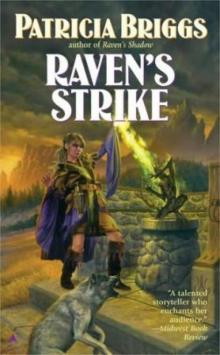 Raven's Strike rd-2
Raven's Strike rd-2![[Mercy 03] - Iron Kissed Read online](http://i1.bookreadfree.com/i/03/24/mercy_03_-_iron_kissed_preview.jpg) [Mercy 03] - Iron Kissed
[Mercy 03] - Iron Kissed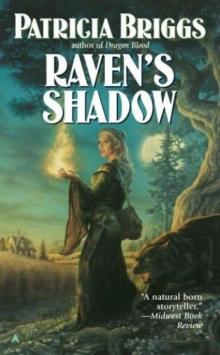 Raven's Shadow rd-1
Raven's Shadow rd-1 Frost Burned mt-7
Frost Burned mt-7 Dragon Bones h-1
Dragon Bones h-1 Shifting Shadows: Stories from the World of Mercy Thompson
Shifting Shadows: Stories from the World of Mercy Thompson Silver Borne mt-5
Silver Borne mt-5 Wolfsbane s-2
Wolfsbane s-2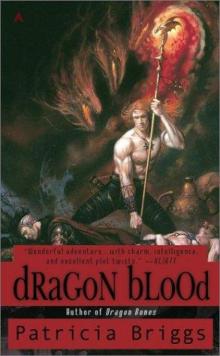 Dragon Blood h-2
Dragon Blood h-2 Iron Kissed mt-3
Iron Kissed mt-3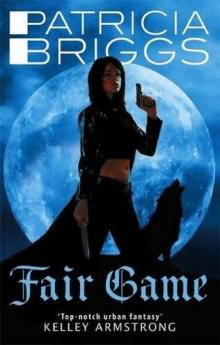 Fair Game aao-3
Fair Game aao-3 Masques s-1
Masques s-1![[Hurog 01] - Dragon Bones Read online](http://i1.bookreadfree.com/i1/04/03/hurog_01_-_dragon_bones_preview.jpg) [Hurog 01] - Dragon Bones
[Hurog 01] - Dragon Bones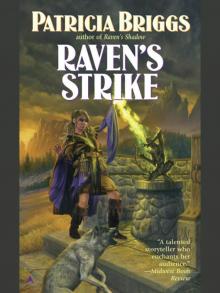 Raven s Strike
Raven s Strike Mercedes Thompson 03: Iron Kissed
Mercedes Thompson 03: Iron Kissed Bone Crossed mt-4
Bone Crossed mt-4 Blood Bound mt-2
Blood Bound mt-2![[Mercy 01] - Moon Called Read online](http://i1.bookreadfree.com/i2/04/09/mercy_01_-_moon_called_preview.jpg) [Mercy 01] - Moon Called
[Mercy 01] - Moon Called River Marked mt-6
River Marked mt-6 The Mercy Thompson Collection
The Mercy Thompson Collection Moon Called mt-1
Moon Called mt-1 Mercy Thompson 8: Night Broken
Mercy Thompson 8: Night Broken